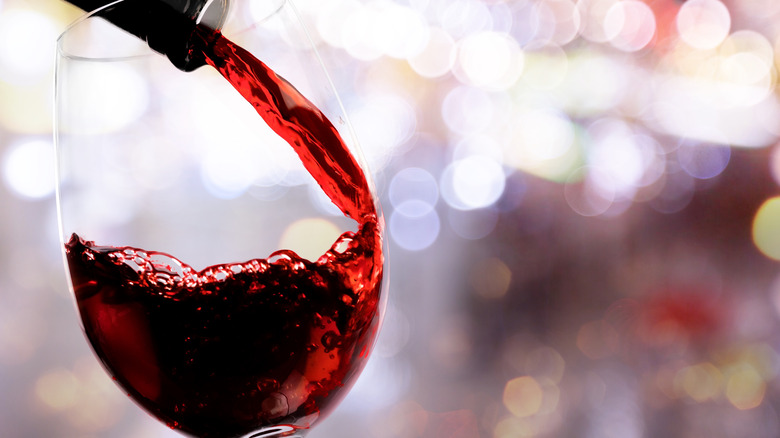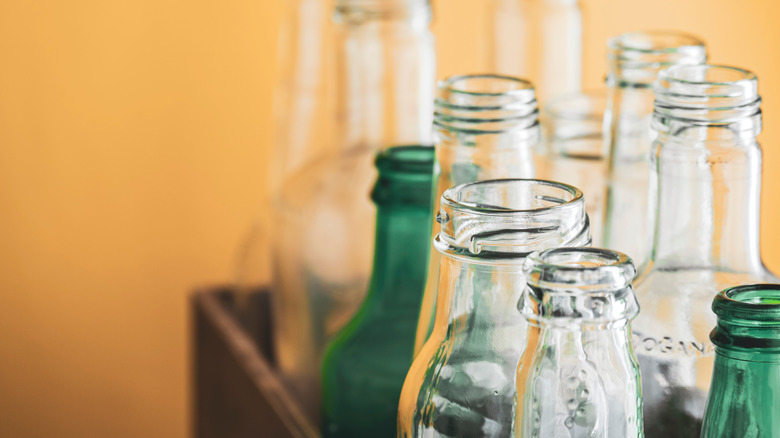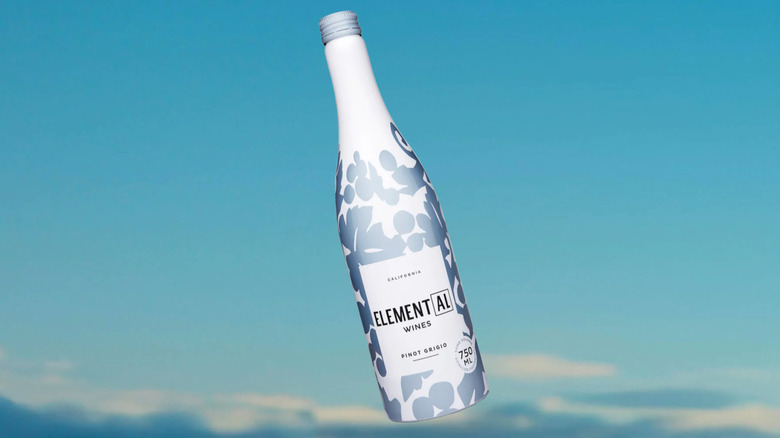Are Aluminum Bottles The Eco-Friendly Solution To Wine's High Carbon Footprint?
People have been drinking wine from glass bottles for thousands of years. It's something we often take for granted, but it might be time to think about switching things up. Glass bottles used for wine have an enormous ecological impact, and contribute to the high carbon footprint produced by the wine industry.
Glass is heavy, and requires a lot of fuel to transport. Glass bottles are also generally conceived of as single-use containers, and only about a third of glass products in the U.S. get recycled, according to the EPA. Glass manufacturing requires a lot of energy and resources, produces high amounts of greenhouse gasses, and has been linked with a worldwide sand shortage.
The desire to move beyond glass has led to a recent increase in boxed wine sales. Though once associated with an inferior product — one of the many myths about wine you shouldn't believe — these brands have been using the sustainability of their packaging as a selling point.
But one wine brand has decided to go a step further and offer their own solution to the ecological conundrum with wine sold in aluminum bottles. Element[AL], a California-based wine company, has invested three years of research into the launch of a groundbreaking collection of new beverages designed with an eye towards sustainability without compromise.
Why use aluminum bottles?
For a long stretch of time, glass wine bottles were generally returned after use, cleaned, and refilled with wine. This practice was necessary back when glass was more of an expensive rarity, and industrial production was not yet as advanced as it is today. It's only for the relatively short period between the end of World War II and today that we have viewed glass bottles as single-use commodities, leading to their overproduction and a failure to reuse or recycle them.
To combat this waste, Element[AL] has designed revolutionary, one-of-a-kind aluminum bottles. They retain the familiar shape of classic wine bottles, but are 80% lighter. They are also thinner, and don't have the punts that many wine bottles have, which serve an uncertain purpose and make wine bottles unnecessarily larger. Without them, Element[AL]'s bottles are smaller, though they hold the same amount of liquid. This means that the same truck shipment of Element[AL] wine can hold 43% more cases without adding any additional weight, reducing the fuel needed to transport the same amount of wine.
Element[AL]'s aluminum bottles can be recycled into new products indefinitely, and the energy required to recycle them is very low. Aluminum is also more commonly recycled than glass, increasing the likelihood that these bottles find a second life. Many municipal recycling programs also prefer aluminum to glass, or no longer recycle glass at all. And on top of all that, a great benefit is that these aluminum bottles are also shatter-proof, making them an all-around great benefit for consumers and the wine industry at large.
Does aluminum affect the flavor of wine?
Element[AL] is set to carry four popular grape varietals grown on sustainable vineyards: Chardonnay, Pinot Grigio, Rosé, and Pinot Noir. And while there is limited information available on the aging potential of wine in aluminum bottles, the short-term benefits, at least taste-wise, appear promising. In blind taste tests, testers have not been able to spot a difference in flavor between wine stored in these aluminum bottles over the course of a year, and wine stored in glass bottles over the same duration.
While it may seem like sacrilege to store wine in metal, it's worth considering that most soda and beer cans are made from aluminum, as are a lot of reusable water bottles. Not to mention that canned wine is becoming increasingly popular. Aluminum is generally considered to be safe to drink from, according to the CDC.
In fact, many wine bottles today use screw caps that are made of aluminum. Once considered the hallmark of cheap wine, screw top wine bottles, which are more reliable than cork, have evolved into a practical component of everyday wine production.
Elemental[AL]'s pros and cons both lie in the novelty of the company's product. It's all-around a more ecologically sound design than traditional glass bottles, and could save the industry money and transportation resources. That being said innovation in the wine industry is hard to take root, so it will remain to be seen if experts and consumers will cheer on this new design.



